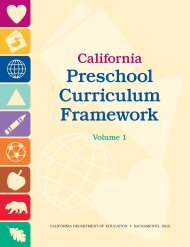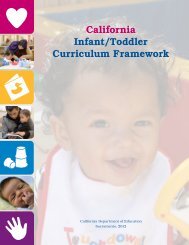California Preschool Learning Foundations - ECEZero2Three ...
California Preschool Learning Foundations - ECEZero2Three ...
California Preschool Learning Foundations - ECEZero2Three ...
Create successful ePaper yourself
Turn your PDF publications into a flip-book with our unique Google optimized e-Paper software.
SOCIAL-EMOTIONAL DEVELOPMENT<br />
28<br />
Children’s play with peers changes<br />
significantly during the later preschool<br />
period. <strong>Preschool</strong>ers become capable<br />
of greater cooperation and coordination<br />
in their shared activity, playing<br />
interactively rather than just side by<br />
side. In addition, imaginative or pretend<br />
play—one of the hallmarks of<br />
preschool play activity—develops significantly<br />
in complexity and sophistication.<br />
Young children proceed from<br />
simple sequences of pretend activity<br />
to well-coordinated, complex episodes<br />
of imaginative play that involve planning,<br />
coordination of roles, and mutual<br />
correction as the story line is enacted<br />
(Goncu 1993; Howes 1987, 1988,<br />
1992; Howes and Matheson 1992).<br />
The remarkable ability of older preschool<br />
children to competently enact<br />
pretend roles, coordinate their activity<br />
with that of other children in pretend<br />
roles, and monitor the unfolding of the<br />
sociodramatic play script is consistent<br />
with—and helps to confirm—much<br />
of what we know about their social<br />
understanding and capacities for<br />
cooperation, self-awareness, and<br />
self-regulation during this period.<br />
Peer interactions do not always<br />
proceed happily, of course. There are<br />
significant developmental changes<br />
during this period in how young<br />
children express their hostility when<br />
disagreements arise. Younger preschool<br />
children are more likely to<br />
respond with physical aggression,<br />
while older preschool children are<br />
more capable of expressing their<br />
hostility in more socially acceptable<br />
Imaginative or pretend play—one of<br />
the hallmarks of preschool play<br />
activity—develops significantly in<br />
complexity and sophistication.<br />
ways and are more likely to use verbal<br />
taunts and teasing rather than hitting<br />
(Tremblay 2000). Fortunately, there<br />
are also developmental changes in<br />
children’s capacities for conflict negotiation,<br />
such that by the later preschool<br />
years, children are capable of spontaneously<br />
suggesting simple conflict<br />
resolution strategies (such as proposing<br />
alternative play materials or taking<br />
turns) and enlisting negotiation over<br />
aggression (Howes 1987, 1988; Rubin<br />
and others 2005; Rubin, Bukowski,<br />
and Parker 2006; Vandell, Nenide, and<br />
Van Winkle 2006). These conflict resolution<br />
strategies will develop further<br />
in the elementary grades, of course,<br />
but differences in the capacities of<br />
preschoolers to spontaneously enlist<br />
conflict resolution strategies are an<br />
important basis for their social competence<br />
with peers at this age.<br />
Group Participation<br />
The ability to participate cooperatively<br />
and constructively in group<br />
activity is an essential skill in any<br />
group learning activity; thus, it is a<br />
critical component of school readiness.<br />
This substrand integrates the<br />
developmental achievements described<br />
in other social-emotional foundations<br />
and applies them to the young child’s<br />
competency as a group member (see<br />
Developmentally Appropriate Practice in<br />
Early Childhood Programs 1997; Landy<br />
2002). These developmental achievements<br />
(described in detail in other<br />
foundations) include:<br />
• Developing capacities for self-regulation<br />
and self-control, which enable<br />
the older preschool child to remember<br />
the rules for classroom behavior,<br />
games, and other activities; apply<br />
the rules to his or her own behav-<br />
<strong>Preschool</strong> <strong>Learning</strong> <strong>Foundations</strong>, Volume 1 • <strong>California</strong> Department of Education
















